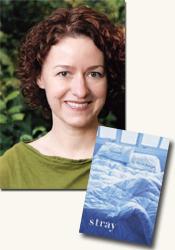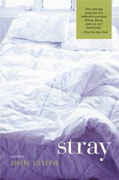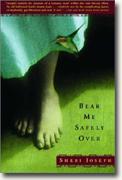author interview
book reviews:
· general fiction
· chick lit/romance
· sci-fi/fantasy
· graphic novels
· nonfiction
· audio books
· author interviews
· children's books @
curledupkids.com
· DVD reviews @
curledupdvd.com
newsletter
win books
buy online
links
home
for authors
& publishiss
for reviewers

|
|||||
 
Curledup.com contributor Michael Leonard interviewed Sheri Joseph,
author of Stray Interviewer Michael Leonard: Stray Sheri Joseph: Stray And how difficult was it to combine all these elements? The elements of murder mystery and police procedural were for me quite difficult to combine with the love triangle. The story I meant to tell, if I meant anything, was the love triangle. The murder and police investigation were only what happened as my characters got themselves deeper into trouble. I was as surprised by the murder as my characters were, and at first I really resisted letting the book go that way. I’m not a crime writer. I don’t even really read crime fiction, and there are so many writers out there writing it who know what they’re doing, and what do I know? But then I thought, well, no reason literary fiction can’t go in this direction if the characters are driving it that way. And I was already in deep with Maggie and her work as a defense attorney, which started as just an element of her character and life situation but then turned out to be a bit like Chekhov’s gun in determining the plot.
As an aspiring actor, Paul gets to explore this idea most directly, though I should say that his aspirations began in character—Paul has a difficult past, and he’s learned to take on various roles as a means of protection. This is something he’s found he’s good at, good enough to extend into acting on stage, but also sometimes a little too good, so that he can have a hard time knowing who he is amongst all the personas. He’s comfortable with deception and uncomfortable with almost anything that’s not a pose. Kent is almost the opposite: essentially incompetent at deception, even though he’s the one who takes on the novel’s biggest burden of it. Maggie’s deceptions are more subtle, more interior, but like the men, she deceives in order to keep the peace, to sustain a fantasy of happiness.
I don’t think the phenomenon is at all new, though it’s something that is often left out of cultural discussions of sexuality. Certain readers of this novel will think immediately, “Oh, Kent’s in the closet” and won’t entertain any other possibility—the belief being that you’re either gay or straight; even “bisexuality” is just latent closet-clinging, etc.. Others, I think, recognize that there’s a long, bumpy spectrum of sexuality between plain “gay” or “straight,” and that all kinds of people, if they can be honest about their desires, are not adequately described by any one category. Those efforts at all-inclusive terms like LGBTQ2A, or whatever, are seemingly destined to collapse under the daily necessity of adding more letters.
Kent obviously loves Paul, but he fears making commitment. He deludes himself into thinking that Maggie is everything that he needs and can offer him a "peaceful life of marriage." He treats this reconnection with Paul as a "fling and a one-time indulgence." Why do you think he does this? Kent’s emotions change so much throughout the book and gradually reveal deeper layers; the three states you mention really come from three different parts of the story, or maybe multiple parts. At the opening, he’s newly married, happy, committed to making his marriage work; and Maggie is someone who is authentically good for him in a lot of ways. If he were going to make a logical choice in love, this is the healthier relationship. But of course we rarely make logical choices in love, or choices at all. If we did, Kent would have no business risking Maggie or going anywhere near Paul, who not only disdains the monogamy concept but has left him once already. Being abandoned without closure has left Kent ill-equipped to resist, at least sexually, when Paul returns. Calling it a “a one-time indulgence” is Kent’s rather flimsy way of protecting his marriage, as well as of protecting himself from getting hurt again. And of course it’s a lot of other things, too. As we discover, he’s not as innocent or as victimized in his troubles with Paul as he at first wants to see himself. Of all the characters, Paul seems to have the most emotional growth. At the beginning, he's rather facile and superficial, intent to live the life of a party boy, manipulating those around him and tolerating men he doesn't love in order to live comfortably. What particular changes do you think Paul undergoes throughout the course of the story? Paul is barely into his twenties, though he thinks of himself as a lot older than he is. Sexually, he’s had a pretty rough coming-of-age, and he’s learned some bad habits as coping mechanisms. He doesn’t know what he wants, or—another way of saying the same thing—he wants everything he sees. His most dramatic and obvious change in the novel is that he begins to tire of partying and to think he might be ready to settle down and be committed to one person. But it might be hard for the reader to tell whether this is just more youthful impulsiveness: Paul wants what he sees, and what he sees is a ring on Kent’s finger. He meets Maggie; he sees what marriage to Kent looks like. And he wants it. This makes Paul sound like some kind of predator, but if he is, he’s also a very sweet kid who ran out into the world too soon and misses having a home. He takes up with his professor, Bernard, not only to live comfortably but because he craves a father figure and a mentor; he does love this man, and wants love from him, while he takes his money and holds him at arm’s length.
Why do you think Paul seeks out and befriends Maggie? And what does he hope to get out of the relationship with her? Is he just playing games? Do you really think he's thought through the ramifications of doing something like this? Paul has daredevil tendencies. The last thing he does in just about anything, but especially in his friendship with Maggie, is to think through the ramifications of what he’s doing. A earlier title of the novel was “In the Night Sea,” which refers loosely to Kent’s predicament but specifically to one of Paul’s first acts in the book: he swims out into the ocean at night in the middle of winter. He’s playing a game, a serious one, in that he’s making a bid for power; he’s also playfully, impulsively, doing something dangerous that looks like fun. The same with Maggie. With her, though, the impulse is quickly complicated by sincere affection and the guilt than attends it. And then events intervene, so that before he can stop and rethink, he’s in deeper and deeper. Similarly, Maggie is eventually drawn to Paul – even a bit sexually; she's attracted to his "paradox of sex and innocence." What do you think she means by this? Maggie is solving a mystery, so she’s drawn to paradox; she’s teasing out clues. The closer she gets to Paul and his mystery, the more sex becomes apparent as an element. Maggie’s job as a death penalty defense attorney mires her in some pretty horrific levels of guilt, so in Paul’s case, as in Kent’s case, a lot of what Maggie sees is distorted by her need to believe in the innocence of people she loves. Paul is a sexual shape-shifter, a young man with an even younger look who trades on the appeal of innocence in order to accumulate a whole lot of sexual experience—he actually has a routine in bars in which he pretends to be an ambiguously-aged virgin just off the bus from the sticks, in order to attract somewhat older men who want to play the daddy or the wolf. But Maggie has her own issues. She was raped, so part of Paul’s attraction for her is that he’s harmless—she can be attracted, she can flirt, she can kiss him and touch him, and because he’s gay it feels safe. It’s also innocent, at least on its surface, in terms of what’s allowed to her as a married woman. She’s able to recognize, too, that Paul’s main attraction for her is his paradox, and that the paradox involves her husband. She’s drawn almost against her will to solve it. Maggie is the only character who really uses her faith to help get her through difficult times. Indeed Kent loves her for this and also for her innocence. She also has a mostly positive outlook on life and sees herself as a champion of civil rights. How important is her Mennonite faith to her? What do you think she gets out of her job as a lawyer and a defender of the less fortunate? Maggie is a Mennonite first, not just in what she believes but who she is genetically, a born pacifist who sings four-part harmony like all her family before her. Her faith is so inseparable from her that it’s not marked by a lot of outward signs—it’s just who she is. Because she is a Mennonite, she is a helper of others, unquestioningly. Within her family, she’s a bit of an iconoclast in insisting she can do God’s work as a lawyer, a profession that doesn’t sit well with more traditional Mennonites. As they say, it is too much “of the world.” But that’s Maggie, too: she loves the world. She loves men of the world—the fallen men she represents, the lost sheep outside her faith like Kent and Paul—though her faith warns her how dangerous this kind of involvement is.
Acting—as an art form, a performance on stage—is another positive way of recasting the idea of deception, just as fiction writing is a more elevated way to think of lying. I’m always on the side of the artist and the liar, even though art calls first for honesty. You make up things in order to tell a better truth. Paul is so engrossed in his calling as an actor that he thinks of his life in scenes, especially when under pressure, and he’s a big enough force that people around him have a tendency to be pulled onto his stage against their will. Kent, for instance, who has no aptitude for acting, ends up cornered into a lot of trial-by-fire improv at Paul’s behest. But at a certain point the acting also becomes a real crisis for Paul, who in juggling so many identities comes close to a psychic break, no longer quite able to sort out who he is.
I started out using the Hamlet material for purely naturalistic reasons, as I use everything—it’s the play Bernard would choose to direct, and to cast Paul in—but I was hopeful that material that rich couldn’t fail to yield something interesting for the novel. I had no intentions of creating a parallel per se. What happens, though, with any element that attaches to a character is that it has an effect on how that person thinks and sees the world and ultimately acts in it. Paul has played Hamlet, and he’s the kind of actor trained to make himself believe he is who he plays. For several months of his life, he was Hamlet, and he still has those lines burned into his subconscious so that they resurface in any suggestive situation. It makes him a slightly different person than if he had played Romeo, or a comic role, or if the play had been contemporary. On the surface, Paul and his situation bear little resemblance to Shakespeare’s play, but the more subterranean convergences almost can’t help but emerge when the play is what Paul has for a frame of reference. What do you think was ultimately missing from both Paul and Kent's life that caused them to reconnect with one another again? Neither one of them would have an answer to that, and I don’t think it’s answerable in any one way. In a sense, what happens between them is chance: the car wreck that’s caused by someone turning the wheel an inch to the left when he should have gone right. The simplest thing they lack is what they had once with each other. For Paul, that’s love; for Kent, it’s the intense sexual obsession; and both these are things they believe themselves to be happy without. Neither believes he is lacking anything. The nature of their breakup is also a factor, in that it was quite sudden and both of them were left bereft in a way, missing the other, wondering what the other wanted and what he was thinking. Both have regrets about their original conflict and have rethought their positions, so that they are more open to the other’s differences and willing to think about change. All of this makes it easier for them to slip back in time to where they left off. You seem to be very familiar with the gay party/club scene in Atlanta and you really get to the heart of the type of person that Paul is. How much of the novel is based on your own life experiences? To quote one of my favorite writers, Ron Carlson, “I write about my personal experiences whether I’ve had them or not.” If there’s a spectrum for fiction writers between autobiography and invention, I’m way over on the invention side. I write almost nothing that comes from what happens to me as a person, and since I’m not a gay man you can imagine how much of those characters’ experiences I have to invent. But depending on how you define life experience, it’s all mine—the experience of the heart, of the imagination. You go with your characters into their lives and live it with them. Whose else’s is it if not mine? And, I hope, the reader’s. Paul in particular is someone I feel I know as well as, maybe better than, I know myself. He’s like my child and my true love and my alter-ego, and though I recognize it’s totally irrational I will fight anyone who questions it.
We don't normally think of Atlanta as having a gay/arts/theatre scene. But in Stray Oh, yes. Atlanta is the gay mecca of the South—I think we have something like the third largest per capita gay population of any U.S. city—and theater in particular seems to flourish. Especially gay theater, if that makes sense as a distinction. We also have gay bookstores that are really the only independent bookstores left in the city. The two plays Paul is involved in are a bit unusual for Atlanta in that neither one has any gay content. I might have a slightly distorted view on this, though, because I have friends in the scene and so end up at a lot of gay plays. And we’ll argue about this: my friends think there are hardly any gay plays, there aren’t nearly enough gay plays. And also not enough theaters, not enough roles. The style of Stray Very, and thanks! I’m pleased you think so. I’m one of those people who can happily tinker with a single sentence for hours, then come back to it later and do a few more hours… This book took about three years to write, and that’s coming from a person who has no other life to speak of. You pour all this sweat into the thing and hope that what results will look effortless, and also that someone will notice and care one way or the other. And finally, do you have any other writers that you like to draw upon for inspiration? And are you working on any up and coming projects? If so, would you like to share a bit about them with us? I’m inspired by almost everything I read, and I’m always reading something. Faulkner is a big influence, one I’ll probably always have to struggle a little to overcome, but there are so many writers I love: Melville, Shakespeare, Dostoyevsky, James, Nabokov, O’Connor, Mann, Welty, Woolf, Toni Morrison, Peter Taylor, Marilynne Robinson, Shirley Hazzard, Jim Crace, Louise Erdrich, Richard Russo, Michael Cunningham, Richard Yates, Alice Munro—just to name a slew at random. I hope I’ve drawn from and learned from all of them somehow.
Sheri Joseph's first book was a cycle of stories, Bear Me Safely Over. She lives in Atlanta, where she teaches in the creative writing progam at Georgia State University and serves as fiction editor of Five Points. Contributing reviewer Michael Leonard interviewed Sheri Joseph, author of Stray (see accompanying review), about her book for curledup.com. Michael Leonard/2007.
|
|||||
| fiction · sf/f · comic books · nonfiction · audio newsletter · free book contest · buy books online review index · links · · authors & publishiss reviewers |
|
| site by ELBO Computing Resources, Inc. | |


